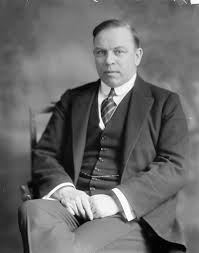Electoral reform! Everyone’s favourite subject. I actually find the debates about specific electoral systems and their merits, while important, rather uninteresting. However, the history of electoral reform in this country is a fascinating study of political promises and subsequent delay. Within this context I want to look at the Liberal Party’s 32 point plan for “Restoring Trust in Canada’s Democracy.” For, rather than simply promising to implement a certain electoral system if the Liberals are elected, Trudeau’s promise to create a special committee of Parliament to study the issue and report back in a year demonstrates he has learned his politics from one of the Liberal Party’s giants but not his father, Pierre Trudeau. Rather Justin’s actions mirror those of William Lyon Mackenzie King, suggesting little chance of real reform if the Liberals are elected in October.
The problem for Justin Trudeau is very similar to the one Leader of the Opposition Mackenzie King faced in 1921. Opposing an unpopular Conservative government widely viewed as autocratic and domineering, the new Liberal leader rolled out an extensive program of reform designed to promote and protect Canadian democracy while simultaneously swaying hopes away from the Progressive Party, an ascendant left-wing party that threatened to eclipse the Liberals as the voice of the disaffected. Yet despite King’s victory, our present electoral system functions much the same as it did 94 years ago for the 1921 election.
King promised change, and to this end, created a special Parliamentary Committee to investigate reforming the voting process,. However, his Government never enacted substantial reform measures. Similarly, in the run-up to the 1935 election, King, again in opposition, campaigned on the need for substantial reform to Canada’s voting system. He won a majority, and established another Parliamentary Committee on the topic, but when it reported in 1936 and 1937, King declined to bring forward any of the legislation it recommended.
Finally, such a tactic was not limited to his time spent in opposition, as in 1943, while in government and dealing with a resurgent Co-operative Commonwealth Federation – forerunners of today’s NDP – King established a special Parliamentary Committee to investigate post-war democratic reforms, none of which his government ever enacted.
The problem for King then, as it is for Trudeau now, is that electoral reform is a deeply divisive both in and out of the party. The Greens and the NDP stand to benefit from reform in the 2015 election, as did the Progressive and Independent Labour parties in 1921. However, the case for the Liberals is less clear. During the 1919 Liberal Convention multiple riding associations put forward resolutions supporting either ranked ballots, proportional representation or a run-off system. King, like Trudeau, had a large section of his party clamouring for real reform while voters in key battleground areas like BC and Ontario remained lukewarm at best to any prospect of change. By proposing to better study the issue before taking legislative action later in the government’s term, Liberal Leaders can satisfy their base and left-wing voters who demand reform while still appealing to more conservative voters by promising restraint.
Overall, examining Trudeau’s proposals in the context of his party’s past flirtations with electoral reform should make one extremely skeptical of the recent commitment to renewing Canadian democracy. However, it also demonstrates that Trudeau has read his political history and may be a much more savvy politician than Stephen Harper and the Conservatives – or the Canadian public – give him credit for. For all his charisma and intellect, Pierre Trudeau could be defeated because he was willing to take clear, and often costly, political stands on the basis of his principles. Alternatively, King was able to be everything to everyone come election time, and his ability to avoid defining political positions helped him to become the longest serving Prime Minister in Canadian history. If Justin has absorbed the lessons of King’s tenure in the PMO, the future for both the Tories and real electoral reform in Canada looks bleak.
